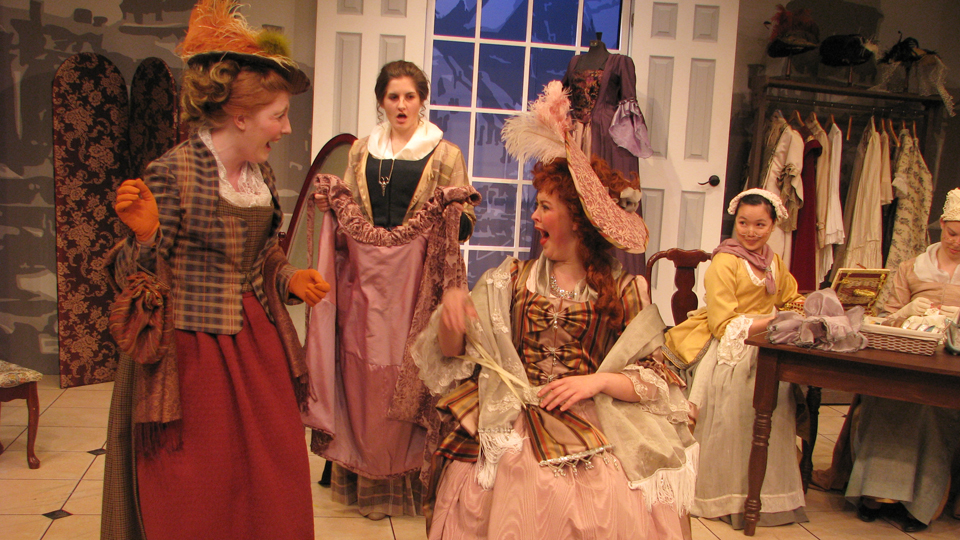Someone should have told the characters in The Witlings that “we have two ears and one mouth so that we can listen twice as much as we speak”.
The comedy takes us back to the 18th century and revolves around a young couple’s struggle to get married and the intermingled obstacles, influences, and observers that make up the rest of the vivacious cast.
Due to a tragic, unforeseen incident, a wedge is driven between the premarital bliss of sweet Cecilia Stanley (Mercedes Morris) and her protective fiancé, Beaufort (Samuel Turner). A series of misunderstandings brought on by a lack of communication threatens to sever their ties for good. Meanwhile, local landlady Mrs. Voluble (Kaitlyn Alexander) works to assure her new high-profile lodger, Mr. Dabler (Tomas Ketchum), that his popular poems and manuscripts will remain untouched and private in his room while, in actuality, she can’t resist sharing a peek with his other devoted fans during his absences.
On the other end of the class spectrum, Lady Smatter (Bailey Green), the aunt of the groom-to-be, thinks herself very well-learned in the study of poetry, and pompously misattributes famous literary quotations for anyone who will listen. She and her literary circle—made up of old Mr. Codger (Mark Snetzko), who needs extra time to think and reply to everything (time no one ever allows him), and rosy-cheeked Mrs. Sapient (Hannah Ehman), who constantly offers her unsolicited opinion on what would be common sense to anyone else—meet for discussions of (and no small amount of fawning over) Mr. Dabler’s latest works.
Breathlessly running on and off the set is Beaufort’s half-brother, Jack (Jovan Kocic), who, despite his helpful nature, always has a million things to do and a billion places to be before breakfast, a habit that makes him ultimately useless at everything except being a bearer of bad news. And then there’s Beaufort’s good friend, Mr. Censor (Christian Tribuzio), arguably the most level-headed of the bunch (and the resident spoilsport), who, despite his inability to conceal his sense of upper-class superiority, puts his propensity for insults and blackmail to good use by the end of the story.
The primary delights of this performance come not from the central plot, however, but from scenes and characters that have nothing to do with the main storyline. Take Lady Smatter’s poetry club scene. After playing coy, Dabler is flattered by the party into reciting one of his latest pieces. Sapient and Smatter both gush at the compliments he pays them in his verses whilst marvelling at Codger’s silence—“Have you no soul, Mr. Codger?”—and simultaneously whispering to Codger that Dabler has certainly exaggerated the other woman’s charms. Then this circle of excellent friends turns on Codger, literally surrounding him and badgering him with questions, none of which he is given the time to answer. At a servant’s proclamation of Censor’s arrival, Smatter wonders if they should ask Censor’s opinion. Codger’s weary response—“My doubt, madam, is if you will give him time to speak it”—left the audience in teary-eyed laughter for several glorious moments. Often, the hilarity would build up in a scene to the point where a sobering return to the main plotline cut off the giggles and disturbed the pace as everyone sat back, anticipating the next witty line.
Well-executed lines flow throughout the piece, brought to life by the actors who skilfully demonstrate their range of vocal and facial expressions, each filling their position to the highest degree. The script was written in 1779, and although it’s sometimes difficult to follow, it was played with minimal error in evocative, well-timed dialogue.
The costumes by Barbara Rowe and Sheridan’s David Juby were impressive in their level of detail, elaborate in design, and appeared to perfectly match the standards set by the time period and social milieu. A clever lighting trick showed the passage of time by the elongating silhouettes of window frames, and a cutout of a full-length window in the background during Act 1 provided some simple comedic moments as characters would run by in panic or peek through as the scene played out.
Director Patrick Young’s adaption of Frances Burney’s play is a long one to sit through, but a marvellous, hilarious treat that’s worth rapt attention every minute. A self-educated young playwright, Burney produced several tremendously successful plays in her lifetime, but The Witlings was one that was almost left forever unreleased. Her father and a family friend, though long-time supporters of her work, considered that it simply wasn’t right for a woman to write a comedy, and felt especially that the play’s subtle mockery might be offensive to some members of society.
Thankfully, the play was discovered centuries later and is now running at Theatre Erindale until March 2.

